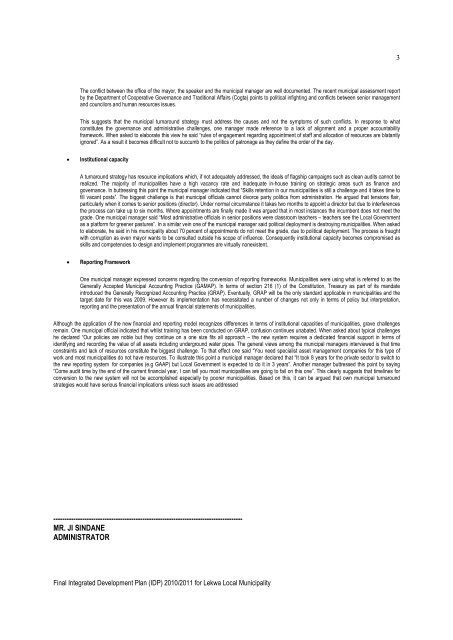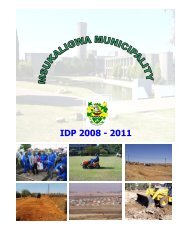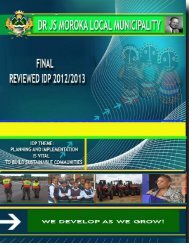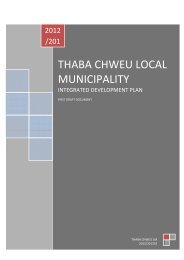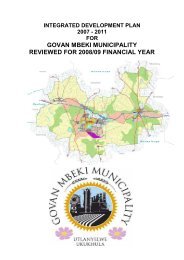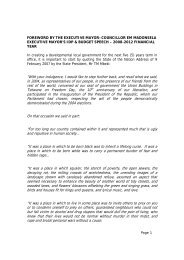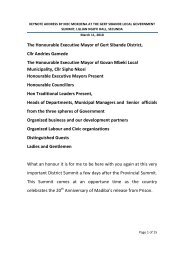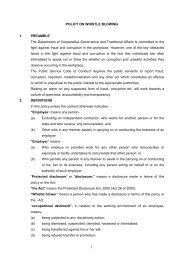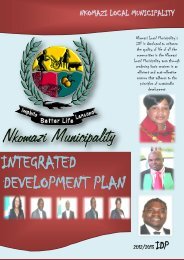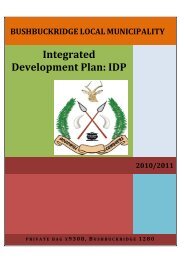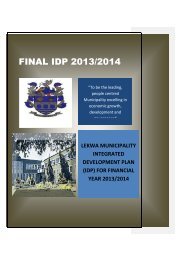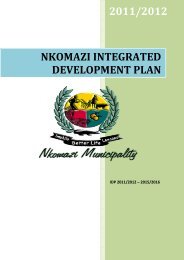2Foreword by AdministratorTHE rollout of the <strong>Local</strong> Government Turn- Around Strategy (LGTAS) which aims to speed up <strong>and</strong> improve service delivery has kicked off.The project, which started end of January, will be done in four phases until March 2011, said the Department of <strong>Co</strong>-<strong>operative</strong> <strong>Governance</strong> <strong>and</strong> Traditional Affairs.The first phase will be the pilot project in which three identified municipalities in the Mpumalanga province will develop Municipal Turn- Around Strategies(MTAS).Bushbuckridge, Dipaleseng <strong>and</strong> Thembisile Hani municipalities are expected to draft their MTAS <strong>and</strong> submit them to their municipal councils <strong>and</strong> theprovincial coordinators.After the submission of these draft strategies, stakeholder engagements will take place in February 2010, the department said.The second phase will include all municipalities in developing their MTAS <strong>and</strong> incorporating them in the Integrated Development Plans (IDP's).The third phase will include the budgeting <strong>and</strong> approval of these IDP's, while the fourth phase will be the implementation phase.The turnaround strategy was developed following last year's service delivery protests where communities were dem<strong>and</strong>ing infrastructure, housing, electricity <strong>and</strong>water, among other essentials. The municipal turnaround strategy will involve communities which had largely been left out of decision making. The Mpumalangaprovince, together with the National Department of <strong>Co</strong>rporative <strong>Governance</strong> <strong>and</strong> Traditional Affairs (COGTA) has unearthed serious challenges confrontingmunicipalities in the Mpumalanga province through the turnaround strategy.In his address during the official opening of the provincial legislature, Premier DD Mabuza said his interaction with Minister for <strong>Co</strong><strong>operative</strong> <strong>Governance</strong> <strong>and</strong>Traditional Affairs, Sicelo Shiceka, revealed that Mpumalanga provincial municipalities face challenges manifesting themselves through:*Service delivery backlogs, chronic fraud <strong>and</strong> corruption induced by both corruptors <strong>and</strong> those being corrupted.* A shrinking skills base in the fields of town planning, engineering <strong>and</strong> financial management <strong>and</strong> dysfunctional intergovernmental service delivery coordinationsystem with glaring provincial support oversight gaps.During visits to local municipalities early this year, a response team deployed by the Department of <strong>Co</strong><strong>operative</strong> <strong>Governance</strong> <strong>and</strong> Traditional Affairs identifiedchallenges faced by these institutions. These included human resource, financial <strong>and</strong> functionality of the identified municipalities.According to the Department of <strong>Co</strong><strong>operative</strong> <strong>Governance</strong> <strong>and</strong> Traditional Affairs, a template outlining specific challenges facing each of the two municipalities hasbeen created <strong>and</strong> this will be sent to various municipalities to form part of their integrated development plan to be adopted. <strong>Lekwa</strong> is one of those municipalitiesthat faced challenges <strong>and</strong> have adopted a turnaround strategy to address those challenges.The legislative configuration in respect of the separation of powers between governance <strong>and</strong> administration has created a fertile ground for the politicization ofadministration. Clear guidelines on the delegation of authority must be reviewed to address gaps so that administration <strong>and</strong> its associated powers are articulated.It is difficult to design effective performance management system in the absence of a tight delegation framework. The issues raised <strong>and</strong> the recent spate ofprotests signals systemic <strong>and</strong> structural challenges. The pronouncement of their own municipal turnaround strategies without addressing systemic issues canonly lead to compliance without material differences – service delivery is about ensuring material difference in the lives of the communities.It can also be argued that any strategy has resource implications <strong>and</strong> therefore the impending municipal turnarounds are no exception. For the strategy to beeffective, <strong>Lekwa</strong> municipality must implement measures aimed at boosting income. Financial viability cannot be divorced from vigorous revenue in the form ofrates.• Leadership challengeLeadership challenges must be resolved, as continuation will further compromise delivery. In practical terms, part of the business re-engineeringprocess must include role definition between the mayor’s office, the speaker’s office <strong>and</strong> the municipal manager’s office. Tensions at this level arebeing attributed to a lack of clear definition of role <strong>and</strong> responsibilities.• <strong>Co</strong>mmunications<strong>Co</strong>mmunication should be about how the municipality generates income, plans to upgrade infrastructure, provisioning of services such as water,refuse removal <strong>and</strong> costs for such projects. It was reported that if municipalities communicate these issues, public confidence can be restored.• Legislative frameworkThe sphere of local government is not without legislative frameworks to guide service delivery. For example section 152 of the <strong>Co</strong>nstitution is clearon the role of <strong>Local</strong> Government. Similarly the Municipal Systems Act provides guidelines <strong>and</strong> yet challenges pointing to the framework continueunabated.The current legislative framework on the separation of powers between administration <strong>and</strong> executive is said to be problematic in that the boundariesare not clearly defined as in other spheres of Government. The view of the administrator is that “In the absence of a clear division of labour betweenthe mayor’s office, the office of the speaker <strong>and</strong> the office of the municipal manager tensions <strong>and</strong> interference abound”. Challenges promote aculture of non- performance as officials abdicate responsibilities by hiding behind politics. This matter is reflective of the President’s assertion duringhis meeting with cabinet ministers <strong>and</strong> the municipal managers. In that meeting President Zuma indicated a need to review the legislativeframeworks along the national <strong>and</strong> provincial lines. This issue has implications for municipality’s own turnaround strategies as political interferencesmal-administration <strong>and</strong> corruption has been linked to the weaknesses in the legislative framework. The process of the business re-engineering ofmunicipalities must reflect on leadership to warrant authentic change.• <strong>Governance</strong> structureFinal Integrated Development Plan (IDP) 2010/2011 for <strong>Lekwa</strong> <strong>Local</strong> <strong>Municipality</strong>
3The conflict between the office of the mayor, the speaker <strong>and</strong> the municipal manager are well documented. The recent municipal assessment reportby the Department of <strong>Co</strong><strong>operative</strong> <strong>Governance</strong> <strong>and</strong> Traditional Affairs (<strong>Co</strong>gta) points to political infighting <strong>and</strong> conflicts between senior management<strong>and</strong> councilors <strong>and</strong> human resources issues.This suggests that the municipal turnaround strategy must address the causes <strong>and</strong> not the symptoms of such conflicts. In response to whatconstitutes the governance <strong>and</strong> administrative challenges, one manager made reference to a lack of alignment <strong>and</strong> a proper accountabilityframework. When asked to elaborate this view he said “rules of engagement regarding appointment of staff <strong>and</strong> allocation of resources are blatantlyignored”. As a result it becomes difficult not to succumb to the politics of patronage as they define the order of the day.• Institutional capacityA turnaround strategy has resource implications which, if not adequately addressed, the ideals of flagship campaigns such as clean audits cannot berealized. The majority of municipalities have a high vacancy rate <strong>and</strong> inadequate in-house training on strategic areas such as finance <strong>and</strong>governance. In buttressing this point the municipal manager indicated that “Skills retention in our municipalities is still a challenge <strong>and</strong> it takes time tofill vacant posts”. The biggest challenge is that municipal officials cannot divorce party politics from administration. He argued that tensions flair,particularly when it comes to senior positions (director). Under normal circumstance it takes two months to appoint a director but due to interferencesthe process can take up to six months. Where appointments are finally made it was argued that in most instances the incumbent does not meet thegrade. One municipal manager said “Most administrative officials in senior positions were classroom teachers – teachers see the <strong>Local</strong> Governmentas a platform for greener pastures”. In a similar vein one of the municipal manager said political deployment is destroying municipalities. When askedto elaborate, he said in his municipality about 70 percent of appointments do not meet the grade, due to political deployment. The process is fraughtwith corruption as even mayor wants to be consulted outside his scope of influence. <strong>Co</strong>nsequently institutional capacity becomes compromised asskills <strong>and</strong> competencies to design <strong>and</strong> implement programmes are virtually nonexistent.• Reporting FrameworkOne municipal manager expressed concerns regarding the conversion of reporting frameworks. Municipalities were using what is referred to as theGenerally Accepted Municipal Accounting Practice (GAMAP). In terms of section 216 (1) of the <strong>Co</strong>nstitution, Treasury as part of its m<strong>and</strong>ateintroduced the Generally Recognized Accounting Practice (GRAP). Eventually, GRAP will be the only st<strong>and</strong>ard applicable in municipalities <strong>and</strong> thetarget date for this was 2009. However its implementation has necessitated a number of changes not only in terms of policy but interpretation,reporting <strong>and</strong> the presentation of the annual financial statements of municipalities.Although the application of the new financial <strong>and</strong> reporting model recognizes differences in terms of institutional capacities of municipalities, grave challengesremain. One municipal official indicated that whilst training has been conducted on GRAP, confusion continues unabated. When asked about typical challengeshe declared “Our policies are noble but they continue on a one size fits all approach – the new system requires a dedicated financial support in terms ofidentifying <strong>and</strong> recording the value of all assets including underground water pipes. The general views among the municipal managers interviewed is that timeconstraints <strong>and</strong> lack of resources constitute the biggest challenge. To that effect one said “You need specialist asset management companies for this type ofwork <strong>and</strong> most municipalities do not have resources. To illustrate this point a municipal manager declared that “It took 8 years for the private sector to switch tothe new reporting system for companies (e.g GAAP) but <strong>Local</strong> Government is expected to do it in 3 years”. Another manager buttressed this point by saying“<strong>Co</strong>me audit time by the end of the current financial year, I can tell you most municipalities are going to fail on this one”. This clearly suggests that timelines forconversion to the new system will not be accomplished especially by poorer municipalities. Based on this, it can be argued that own municipal turnaroundstrategies would have serious financial implications unless such issues are addressed-------------------------------------------------------------------------------------MR. JI SINDANEADMINISTRATORFinal Integrated Development Plan (IDP) 2010/2011 for <strong>Lekwa</strong> <strong>Local</strong> <strong>Municipality</strong>


